This Quirky Powerhouse Cutter has a Premium Feel
This knife is a lot like an Emperor penguin: it’s larger than you expect it to be, looks kinda funny, and seems like it should be wearing a suit, but you’re generally happy it’s around.
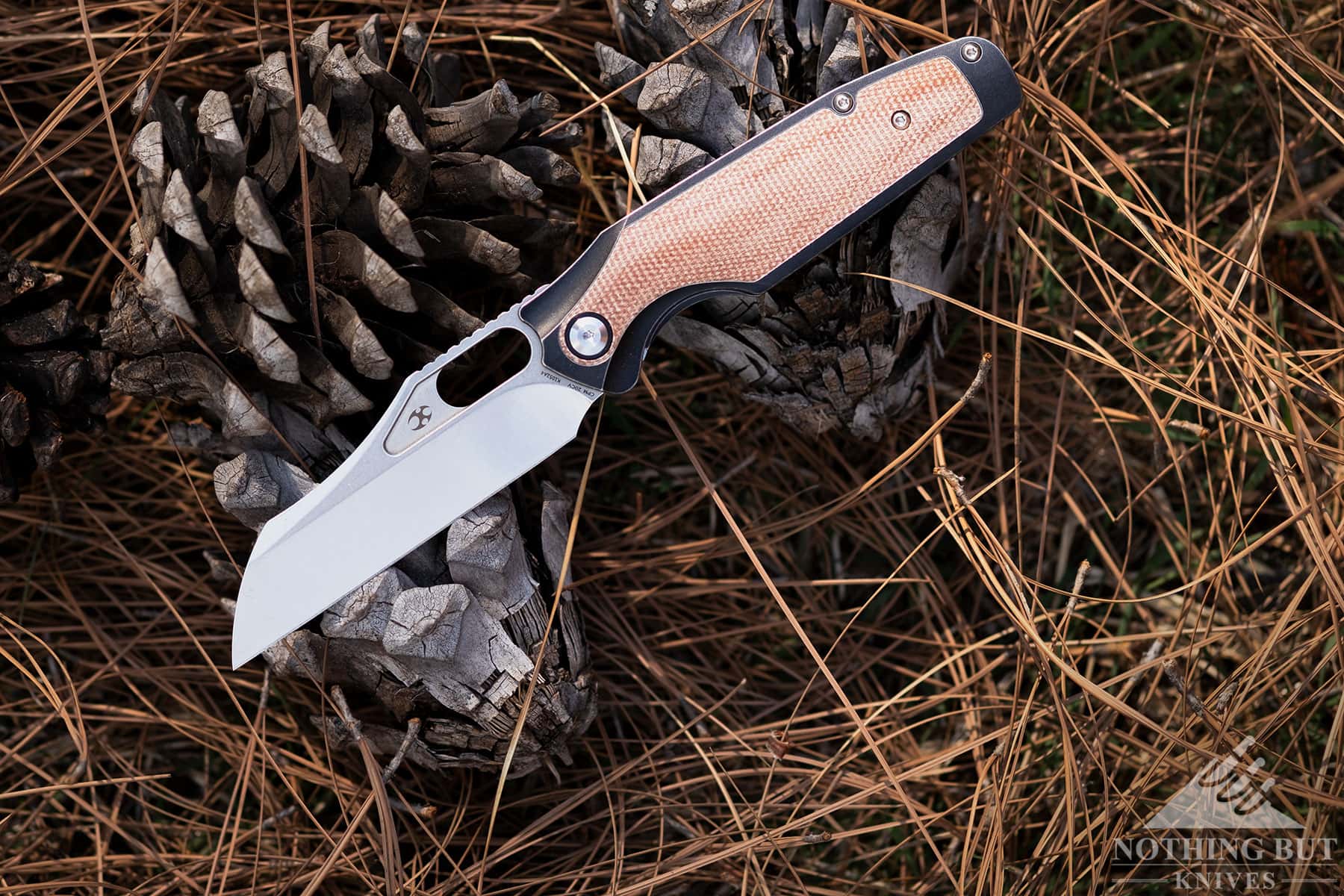
I’m going to say a lot of disparaging things about how the Tuckamore looks, and I want it clear right now that I mean every single word of it.
But I still like it.
- It’s light for its size,
- it’s comfortable,
- it’s a strong utility cutter,
- and it rides lightly in the pocket.
And I do like some of the look to it. The Micarta inserts give a rustic feeling to the sleek steel handle scales, and even the way it ages with use appeals to me.
I see a future with gray scrapes along the corners of the handle, and dark, splotchy Micarta, and I’m going to love every inch of it because this is, above all, a very functional knife that wants to be put to work.
Specifications
| Overall Length: | 8.05” |
| Blade Length: | 3.5” |
| Blade Steel: | COM-20CV |
| Open System: | Thumb/finger hole |
| Blade Thickness: | 0.11” |
| Blade Shape: | Sheepsfoot |
| Blade Grind: | Flat |
| Handle Length: | 4.55” |
| Handle Material: | Titanium w/ Micarta inserts |
| Lock Type: | Frame |
| Weight: | 3.6 oz |
| Designer: | Jonathan Styles |
| Made in: | China |
| What I Liked | What I Didn’t Like |
|---|---|
| Strong blade with good edge retention | Kinda funny looking* |
| Good grip ergos | Metal handle can bite into the hand sometimes |
| Rides light in the pocket for the size | Finger-hole open took some adjustment |
| Silky-smooth action |
The Styles and Rugged Knife Context
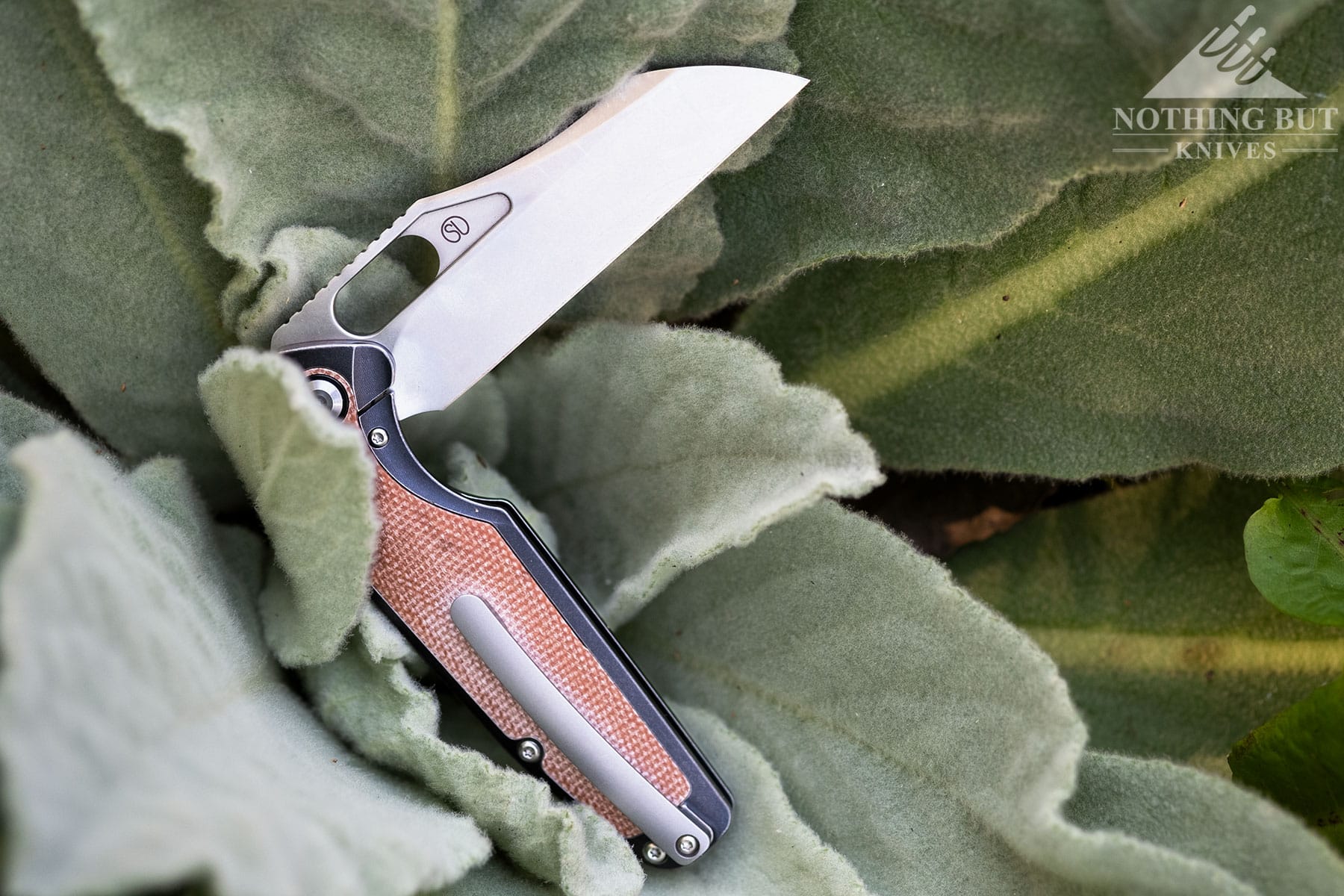
The designer is Jonathan Styles, who apparently has a diverse design language because so far the only other design of his I’ve handled is the Kizer Smolt, which is sort of a back-up EDC fixed blade. But I like the look of basically every production knife he’s designed so far.
The Tuckamore is interesting because it comes off as the dressiest option in a lineup of knives like the Kizer Militaw and Vanguard Fighter.
My first impression was that this is a gentleman’s folder: It’s definitely not optimized for tactical use, and nothing about the look or design screams outdoor adventure. Plus 20CV steel isn’t exactly sought out for its toughness. It’s more of a high-wear-resistance option for high-end limited runs. And the handle has kind of a classy look with all the careful shaping around the lockbar and the insert options for the handle. But Styles is nothing if not a functional designer, so I was really interested to see what this thing was meant to do.
Blade and Cutting Stuff
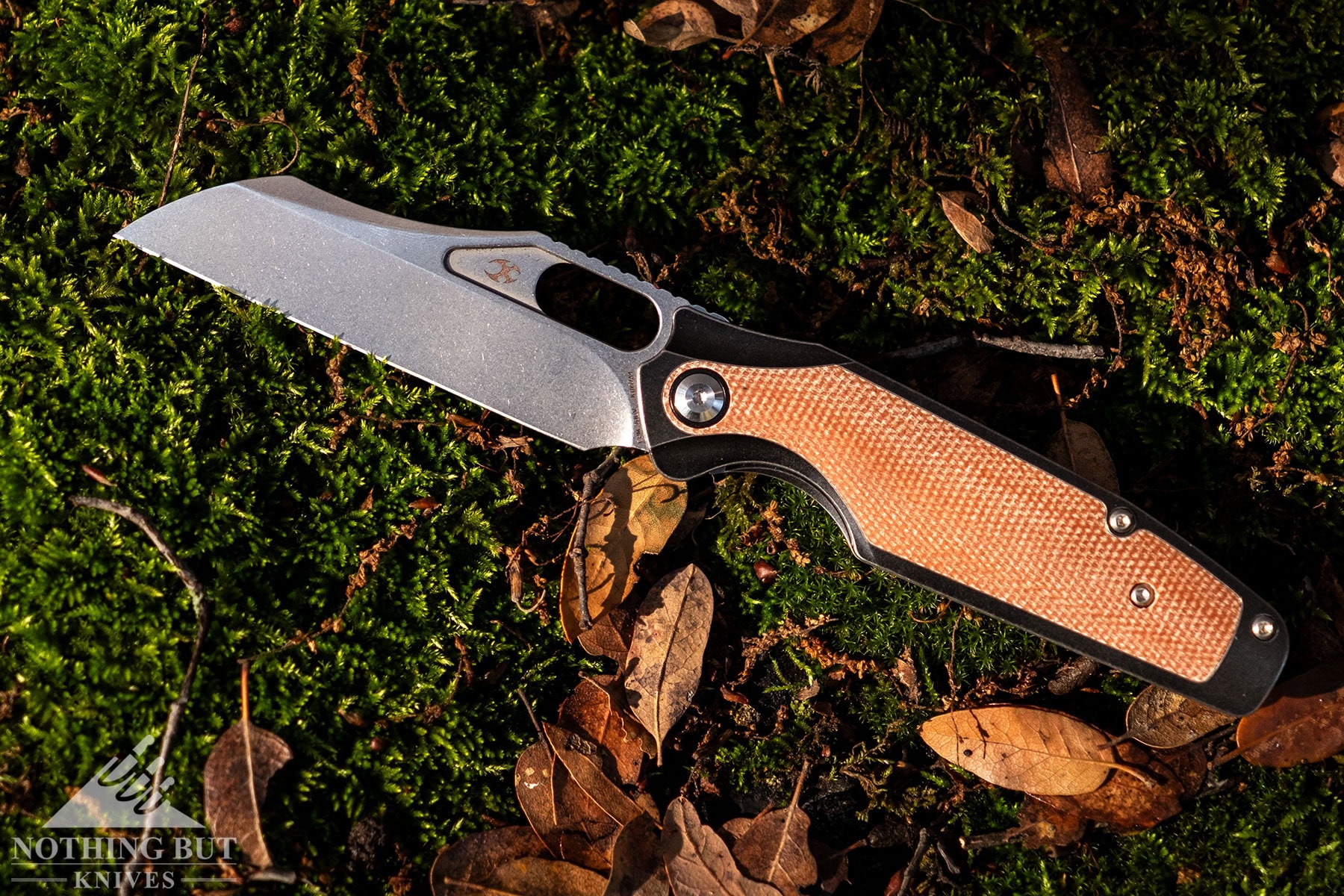
Turns out it was meant to do hard work. The Tuckamore is a power cutter.
It’s not the sliciest thing around, but the edge has some staying power, and the long handle creates a high potential for leverage,
Initial paper tests didn’t blow me away, but it’s fine. This is a thick blade, so I didn’t expect anything close to a laser. It’s definitely not what I’d call a refined cutter, despite my instinct to label it a gentleman’s carry. Considering the price of the knife, I’d say it just clears the hurdle it should.
No, after a few swipes through cardboard, the phrase on my mind was “heavy cutter”.
Never underestimate just how strong a cut can get on a long sheepsfoot blade, no matter what the edge geometry is. There’s just so much leverage to be had, and a wide range of angles you can shift into and still have a lot of cutting edge in contact with something.
Edge Retention Nuance with CPM 20CV
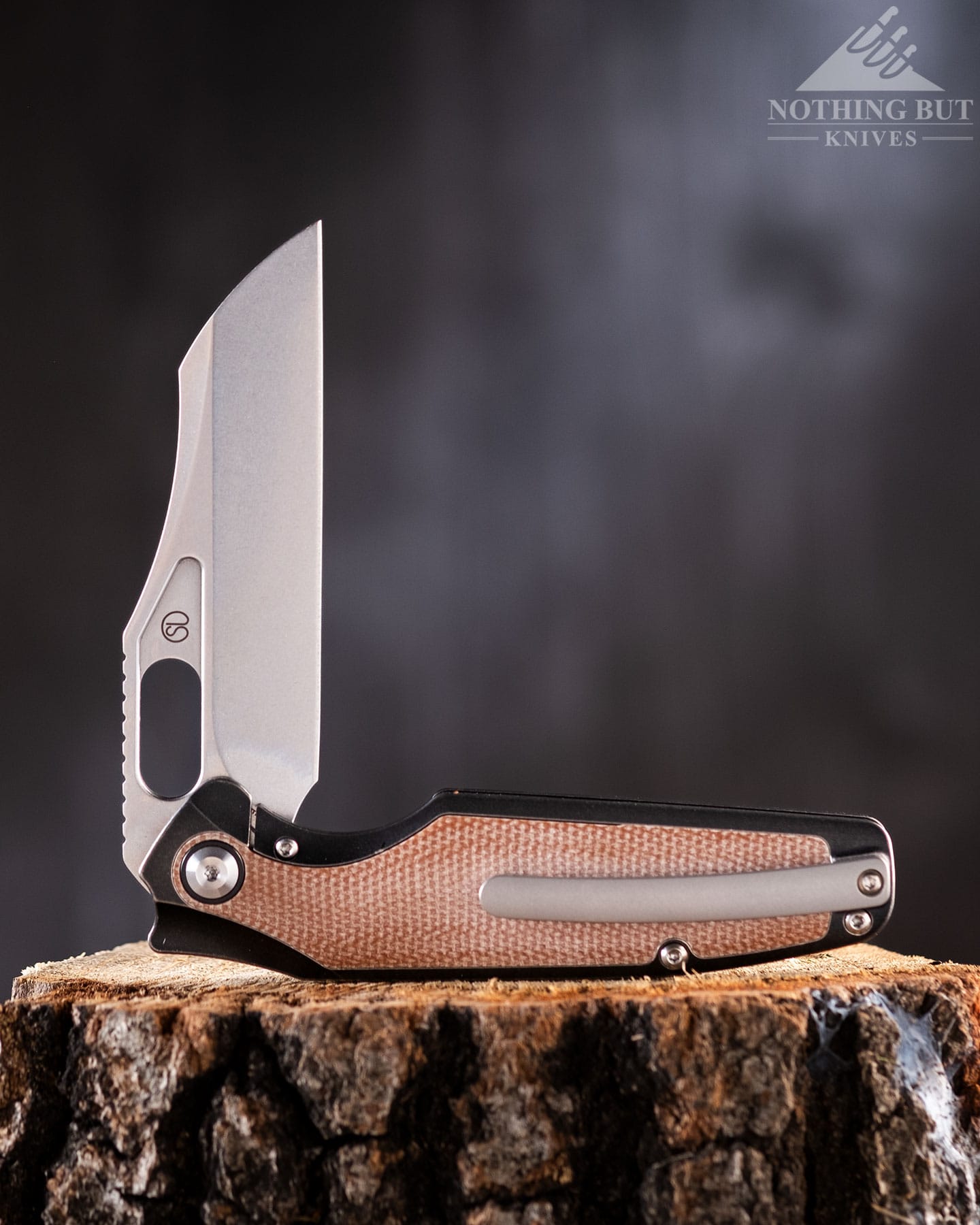
My experience was a little odd here considering the materials.
I was keeping a pretty close eye on the edge, testing it on paper every two or three boxes. I was only about four boxes into the job when the edge started tearing into paper rather than slicing (it was still doing fine on the boxes, though).
So I took it to a honing rod, not really expecting a whole lot, but after about ten passes each side the edge felt good as new. I was able to do push cuts through single sheets of phone book paper. Then I did twenty passes each side on a strop with some green compound and then it really took off, and just kept cutting like a champ all day.
Maybe there was something odd with the factory edge. I don’t know, but if there was it wasn’t hard to polish away.
Ergo Matters: Carries Well,
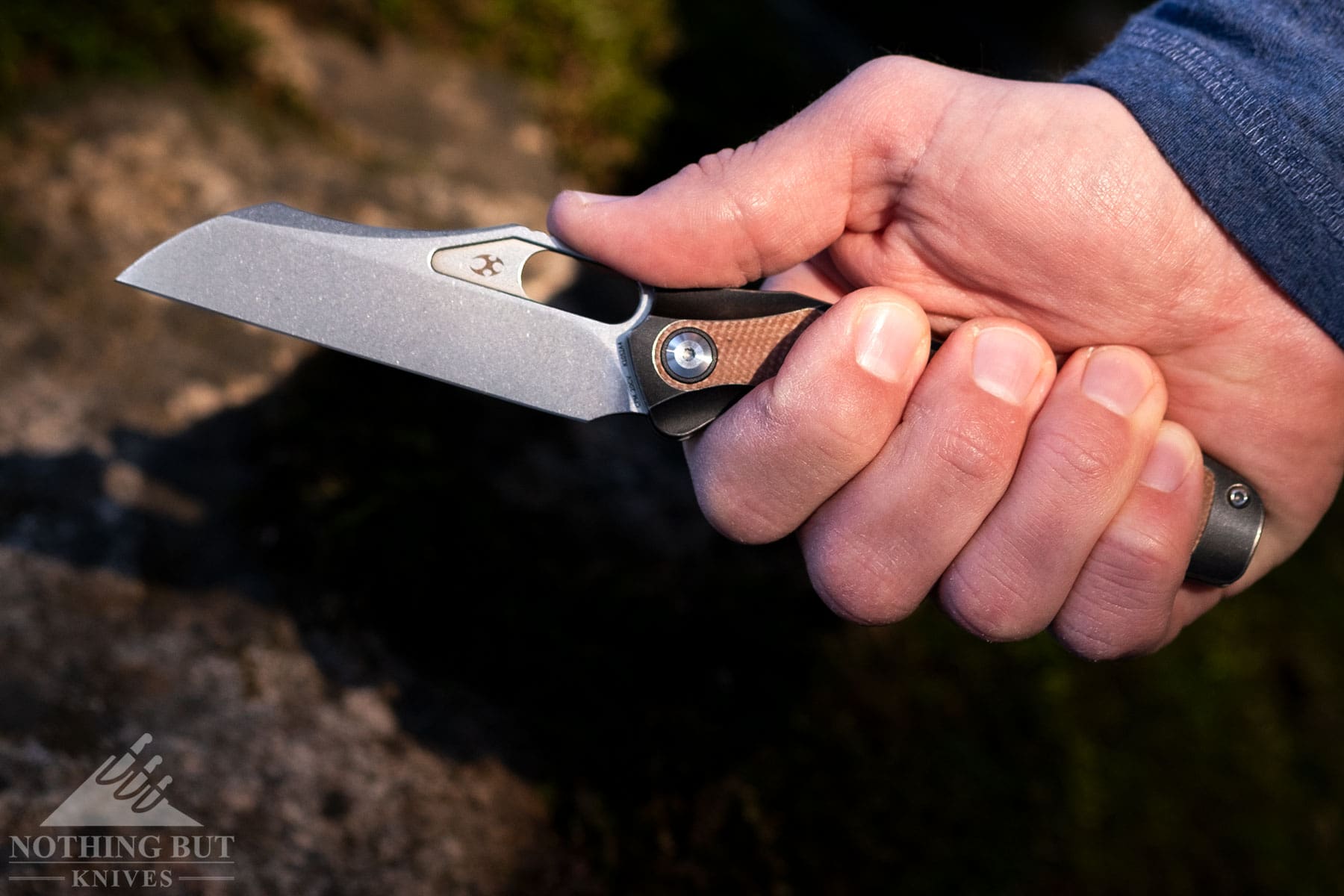
I’m really impressed with the overall feel of the Tuckamore both in the pocket and the hand.
It might look like a piece of raw biscuit dough that someone jammed their thumb into, but those wonky lines in the profile make it comfortable.
- For how long it is, they’ve done a good job shaping the handle so it feels thinner than it actually is.
- It’s contoured where it needs to be to make standard and filipino grips feel secure,
- The pocket clip is big, but doesn’t create any one specific hot spot in hand,
- And the blade is tall enough to pinch up on, which can be nice when working with the tip of a sheepsfoot.
It does have a couple of slight issues:
- The back of the steel handle would bite into the well of my hand (between the thumb and index finger) when I had to push hard into cuts.
- The pocket is super smooth on the draw, but I have to lift it just a little to help it along into the pocket.
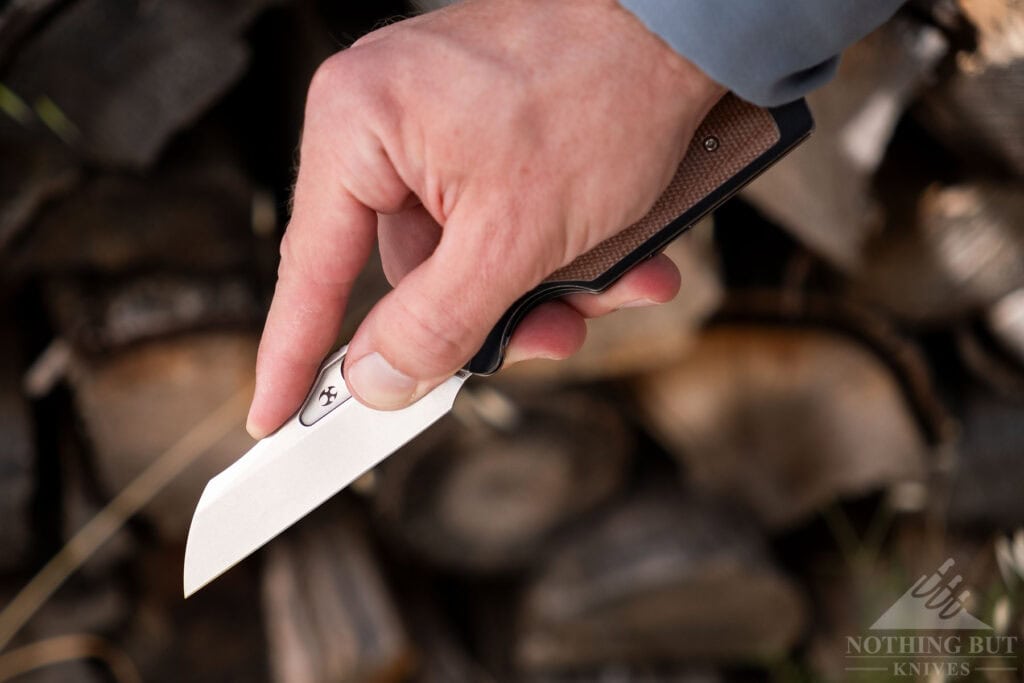
I can handle the bit of discomfort from the steel handle, but the pocket clip does worry me a little.
Probably nothing is going to work its way underneath this pocket clip, but if something does, it wouldn’t take much pressure to pull the knife out without me noticing.
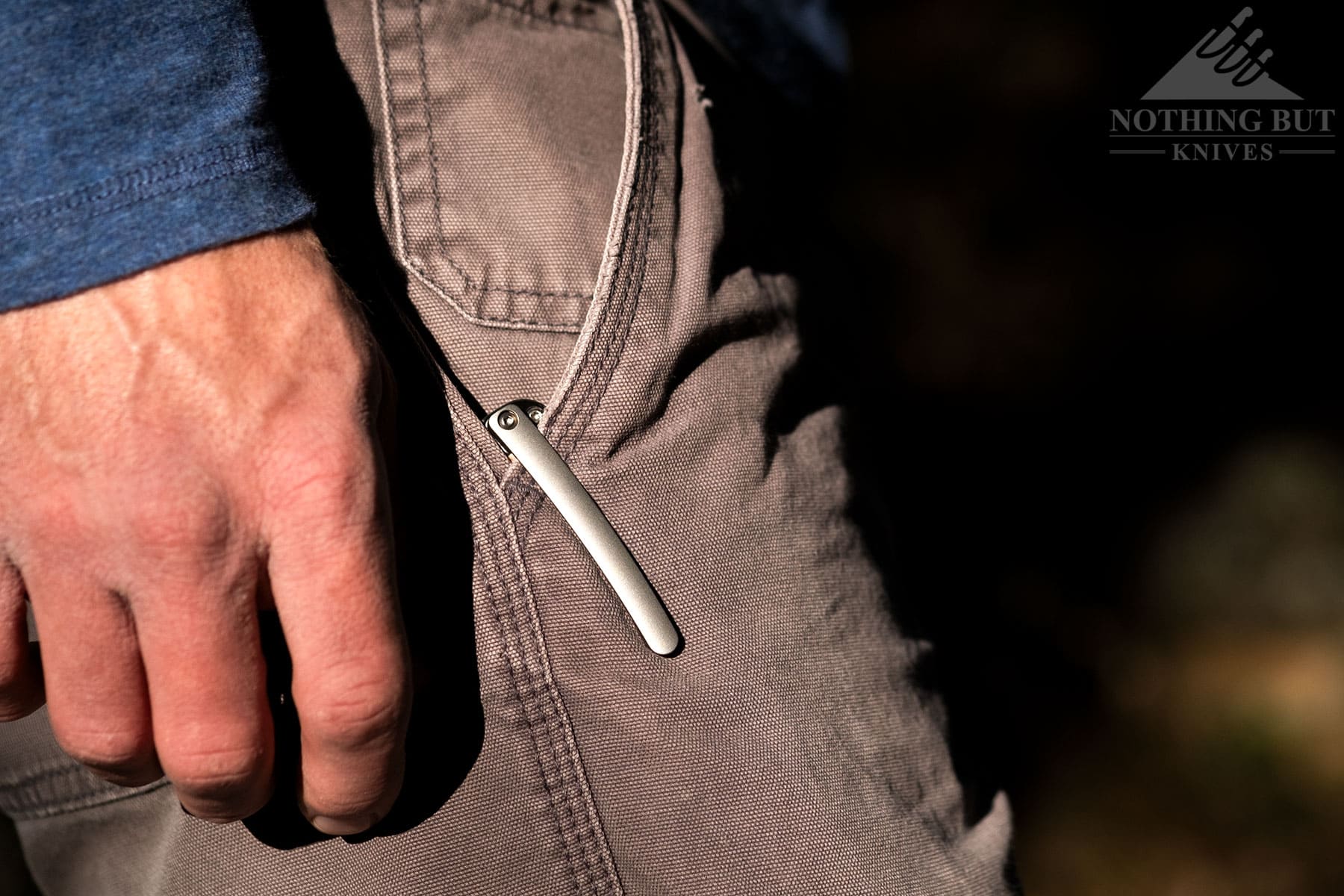
And the combination of the knife feeling surprisingly light in the pocket and my own problem of having a brain that lets environmental details slip through my notice like a colander will almost definitely result in me getting home someday, feeling my pocket and realizing that at some point in the last three hours, a tree flung the Tuckamore out of my pocket and left it on the trail I was hiking.
There’s Also Some Oddness in Opening
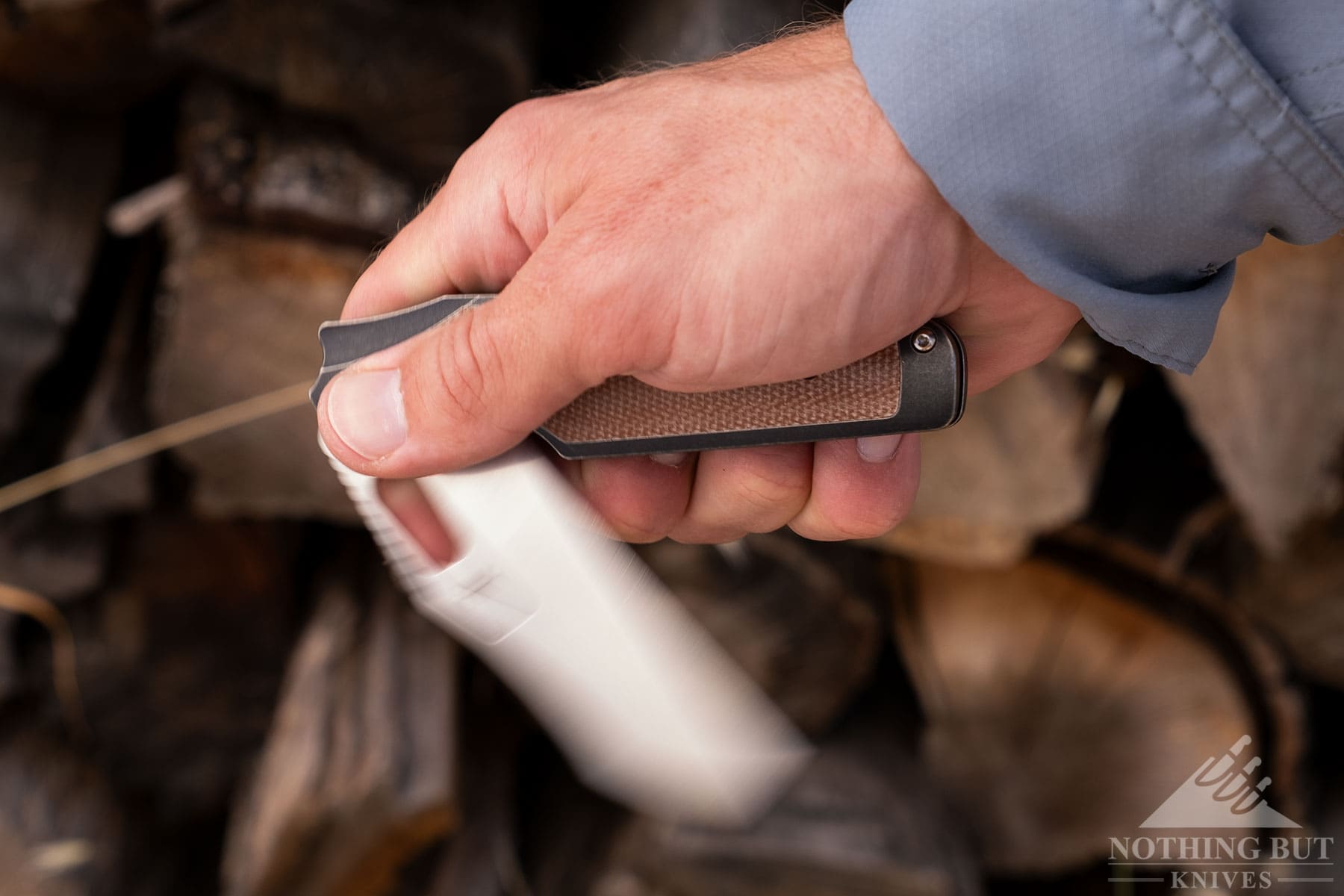
The action is spot on, of course. Kansept keeps up with Civivi and Kizer for reliably silky action in their folders.
What’s odd is this is the first folder I’ve reviewed in a while that doesn’t have a flipper or a thumb stud to open the blade. It’s finger-hole only with this thing.
To make things weirder, the most comfortable way to open it is to flick it open with my index finger. The angle I need to get my thumb into is just a little too awkward, but the action is good enough that I can nudge it with a finger and let my wrist do the rest.
I’ve adapted enough to the point that I can open it without thinking again, but it took about a day to adjust fully to the motion. It’s possible that Spyderco fans won’t be as thrown off by it.
Comparison and Alternatives
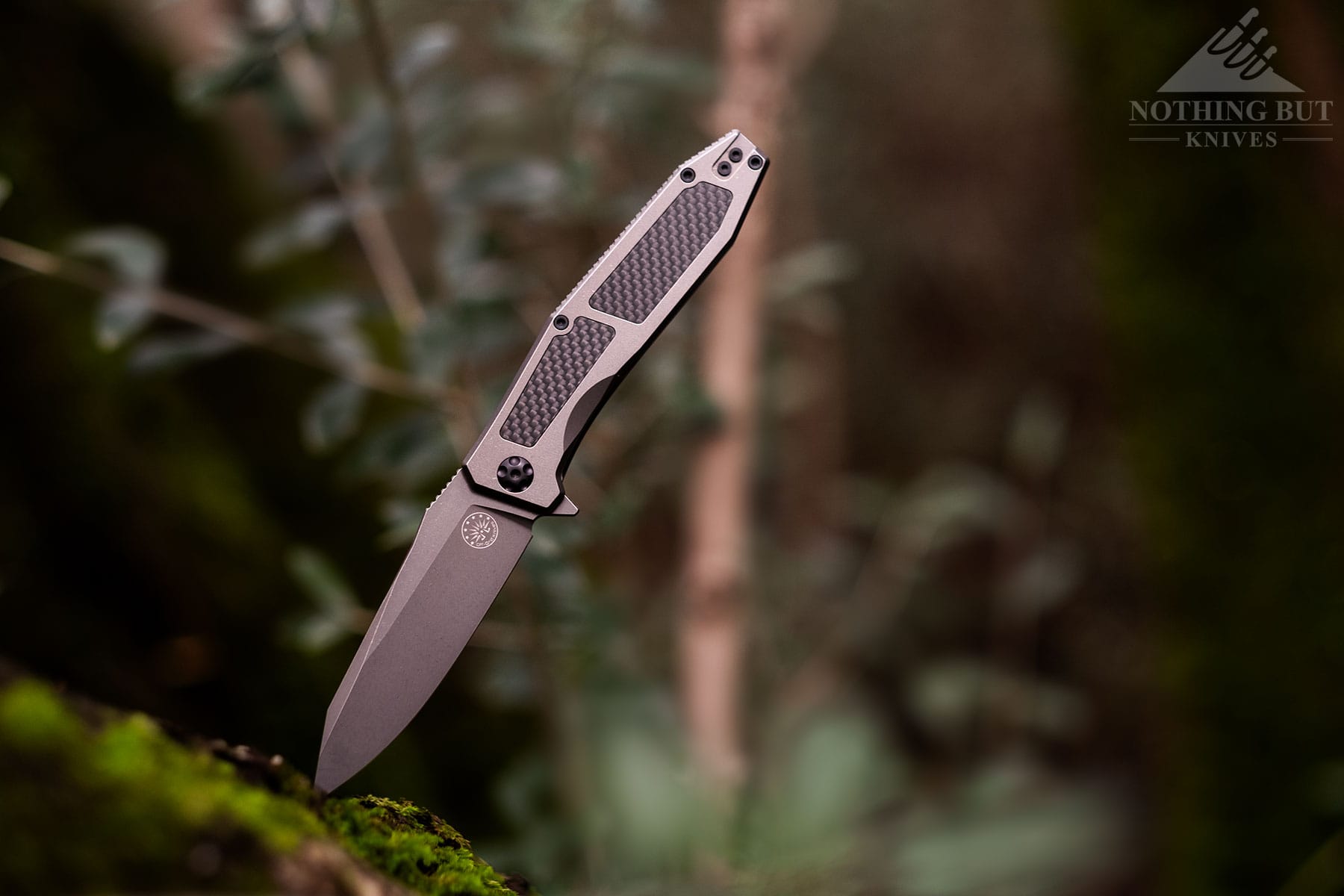
It’s odd and a little out of my range of experience, but the Tuckamore did remind me of a couple of other interesting knives:
- The Off Grid Scorpion is a little more “tactically” oriented but the styling and size are similar, plus they have equivalent blade steels (the Scorpion is sporting Bohler M390)
- The Katsu JT01 is mostly only similar in size and the straight-edge blade shape. The handle feels boxier, and the hollow grind in the blade gives it a harder bite,
- But if you’re just set on a weird knife with a sheepsfoot blade, there’s always the Kizer Sheepdog, which is more comfortable (to me) but definitely feels bulkier.
Conclusion: Funny Looking but Worth a Look
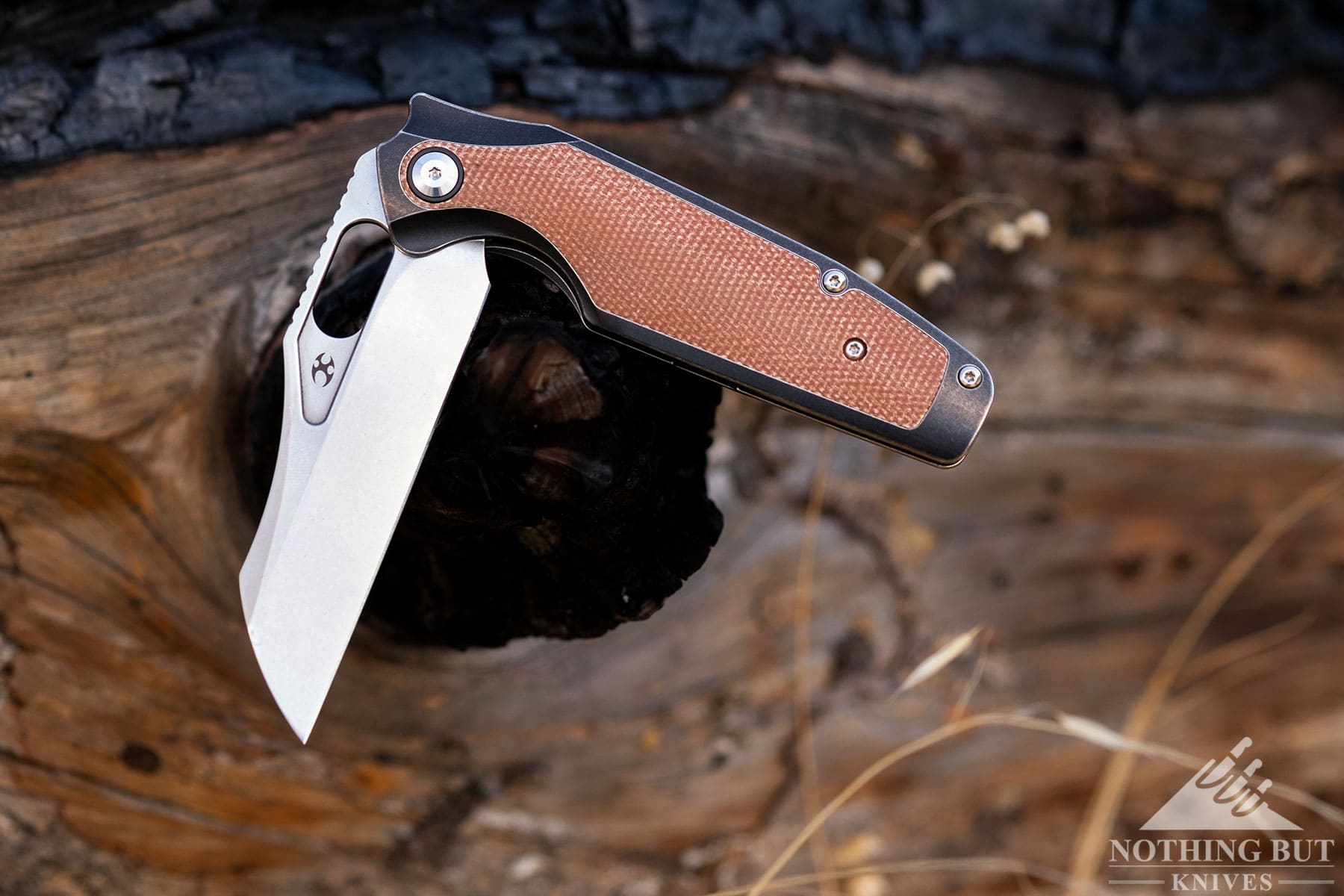
It’s like someone you think is ugly at first because their nose is shaped weird, but then you spend some time with them and they turn out to be a cool hang and also really good at ripping cardboard boxes apart. Then you think “You know what? This is actually cool.”
The Tuckamore has quirks:
The metal of the handle can bite, the edge isn’t exactly a refined cutter, and the opening method took some getting used to.
But if it isn’t a “refined” cutter it still cuts like a champ, the deployment is smooth, and there’s all kinds of good gripping to be had here.
Sometimes the funny looking knife is the one you needed all along.
